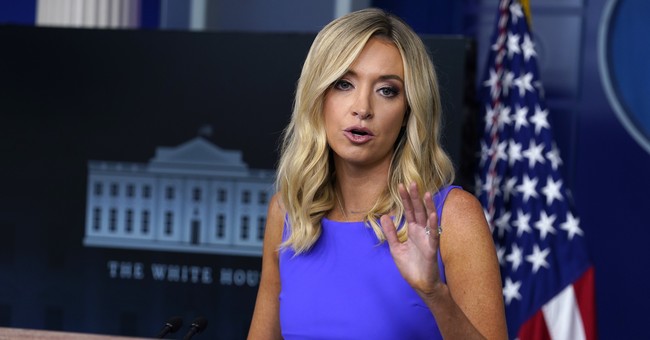
The issue with Twitter and censorship is complicated. On the one hand, the freedom to speak on social media has become a core part of our society (whether that’s a good thing, you can decide). On the other hand, their continued, political encroachment on how the platform is managed can’t be denied either, leaving the question of what should be done, if anything.
Some insist you can’t do anything. They are a private company and they should be able to censor who they want while still enjoying a big government liability carve out that protects them from being sued. Others say it’s time to play hardball and throw Section 230 out completely. As we’ll get to, I don’t subscribe to either of those positions, but this has certainly become a heated debate.
Kayleigh McEnany came prepared today to answer questions about the issue and she absolutely lays out Twitter regarding their selective bias in censoring political speech.
. @PressSec slams Twitter for going out of their way to fact check @realDonaldTrump while allowing Chinese communists to spread misinformation on their platform. pic.twitter.com/fUhC3pQS5p
— Caleb Hull (@CalebJHull) May 28, 2020
McEnany lays out the case for Twitter’s misbehavior in regards to China, including taking advertising money from pro-communist lapdogs that spread misinformation about the Hong Kong protests. Not surprisingly, there were never any “fact-checks” of those posts. She goes further and talks about Google’s Chinese search engine, which blacklisted certain searches that exposed their atrocities.
Later, she pointed out one of the most public examples of Twitter’s hypocrisy, which involved Chinese officials claiming that the United States Army had created and spread the coronavirus. Again, no “fact-check” came, nor were the accounts suspended or posts removed. Moving past China, McEnany also noted Twitter’s blatant censorship of the movie Unplanned, an anti-abortion film, which did absolutely nothing to break Twitter’s TOS at the time. But let Donald Trump make a comment about mail in ballots and they spring to action.
Of course, just because we have the problem pegged, that doesn’t mean every solution is the best solution. I’m failing to see the upside to revoking Section 230 altogether, though some are stumping for that. President Trump’s new EO seems to be mostly flash aimed at pressuring social media to stop censorship. That’s good, but likely won’t end the discussion.
In my opinion, the right way to handle this is to simply add protections for political speech (given the importance to our constitutional rights) and allow Twitter to keep their liability protections in return. What possible harm could come from adding broader protections for free speech into the law? No one seems to want to answer that question, most preferring to beat strawmen to death instead.
In actuality, though, no changes have to happen at all. Nothing is stopping Twitter from just doing the right thing here. They could stop their curation and censoring of political opinions today and everyone would go home a winner. Why won’t they? I don’t know, but I do know that they’ve brought this fight upon themselves. If they want to see it to it’s endpoint, they’ll likely lose (as many on the left, including Joe Biden, are against Section 230). You’d think they’d smarten up and just retreat.
I guess we’ll see what happens. I have a feeling Jack Dorsey is too emotionally invested in his own liberal ideology to diffuse this situation.

